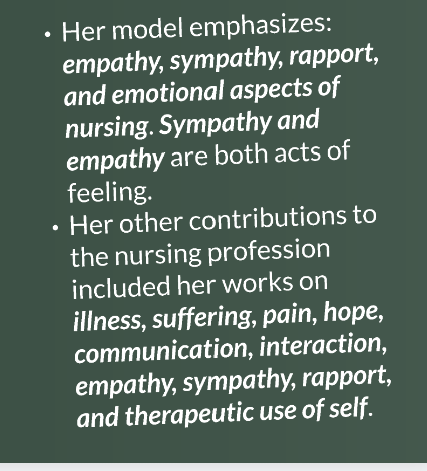Joyce-Travelbee-Human-to-Human-Relationship-Model-of-Nursing
1/34
There's no tags or description
Looks like no tags are added yet.
Name | Mastery | Learn | Test | Matching | Spaced |
|---|
No study sessions yet.
35 Terms
Started to publish articles and journals in nursing at the year?
1963
The year of publication of her first book entitled ______.
1966 and 1971 (Interpersonal Aspects of Nursing)
The year she published her 2nd book intervention in _______?
1969 (Psychiatric Nursing: Process in the One-to-one Relationship)
spiritual values (Theory Concepts)
She believed the ___________ a person holds will determine to a great extent, her perception of illness. The spiritual values of the nurse or her philosophical beliefs about illness and suffering will determine the degree to which he or she will be able to help ill persons find meaning, or no meaning, in these situations.
therapeutic human relationship between the nurse and the patient.
What does she emphasize on this theory?
Theory Concept

Ida Jean Orlando (theoretical Sources)
her instructor -"The nurse is responsible for helping the patient avoid and alleviate the distress of unmet needs." The nurse and patient interrelate with each other.
Viktor Frankl (theoretical Sources)
a survivor of Auschwitz and other Nazi concentration camps - proposed the theory of logotherapy in which a patient is actually confronted with and reoriented toward the meaning of his life.
Rapport (Major Concepts & Definitions)
• is experienced when nurse and patient has progresses through the 4 interlocking phases preceding rapport (4 phases of experience)
Therapeutic use of self (Major Concepts & Definitions)
• ability to use one's personality consciously and in full awareness in an attempt to establish relatedness and to structure nursing intervention.
Communication (Major Concepts & Definitions)
• the vehicle through which nurse-patient relationships are established.
Nurse-patient Interaction (Major Concepts & Definitions)
• refers to any contact between a nurse and an ill person
• an experience or series of experiences between nurse and patient
• means thru which the purpose of nursing is accomplished.
Logical Form (Major Concepts & Definitions)
• an inductive theory that uses specific nursing situations to create general ideas.
1. Original encounter (4 phases of experience)
first impressions
2. Emerging identities (4 phases of experience)
perceiving each other's uniqueness
3. Empathy (4 phases of experience)
ability to share in the person's experience
4. Sympathy (4 phases of experience)
when the nurse wants to lessen the cause of patient's suffering.
Metaparadigm (Nursing)
An interpersonal process whereby the professional nurse practitioner assists an individual, family, or community to prevent or cope with the experience of illness and suffering and if necessary to find meaning in these experiences.
Metaparadigm (Person)
a unique irreplaceable individual - a one time being in this world- like yet unlike any person who has ever lived or ever will live
a unique, irreplaceable individual who is in continuous process of becoming, evolving and changing√ patients are only individual human beings in need of care, services and assistance of other human beings who can render the assistance that is needed
Metaparadigm (Subjective Health)
an individually defined state of well-being in accord with self-appraisal of physical-emotional-spiritual status
Metaparadigm (Objective health)
absence of discernible disease, disability or defect as measured by physical examination, laboratory tests and assessment by spiritual director or psychological counselor
Metaparadigm (Environment)
This can be indirectly equated to the environment. She defined human conditions and life experiences encountered by all men as illness, sufferings, pain and hope.
Metaparadigm (Environment-Illness)
-being unhealthy, but rather explored the human experience of illness
Metaparadigm (Environment-Suffering)
- is a feeling of displeasure which ranges from simple transitory mental, physical or spiritual discomfort to extreme anguish and to those phases beyond anguish; the malignant phase of disdainful "not caring" and apathetic indifference
Metaparadigm (Environment-Pain)
- is not observable, unique experience; is a lonely experience that is difficult to communicate fully to another individual
Metaparadigm (Environment-Hope)
- the desire to gain an end or accomplish a goal combined with some degree of expectation that what is desired or sought is attainable
Metaparadigm (Environment-Hopelessness)
- being devoid of hope
Application to Nursing (Nursing Practice: Hospice)
- self-actualizing life experience. Assumption of the sick role.Meaning of life and sickness and death.
Application to Nursing (Nursing Education)
: Teaches nurses to understand the meaning of illness and suffering.
Application to Nursing (Nursing Research)
: Applied in the theory of caring for cancer patients.
Analysis of the Theory (Clarity)
is not consistent in clarity and origin
definition of terms came from dictionaries and books etc.
used different terms for the same definition
focus more on adult individuals who are sick and the nurse's role in helping them to find meaning in their sickness and suffering
deals in families and their needs but not in the community.
Analysis of the Theory (Simplicity)
not simple; contains different variables
Analysis of the Theory (Generality)
has wide scope of application but applicable only to those patients in distress and life changing events
Analysis of the Theory (Empirical Precision)
low measures of empirical soundness
result of lack of simplicity
defines concepts theoretically but does not define them operationally
the model has not been tested
Analysis of the Theory (Importance)
development of quality of caring
it is useful because of its ability to describe, explain, predict and control a phenomenon
explains the variables that affect the establishment of a therapeutic relationship between nurses and patients
lack of empirical precision also creates lack of usefulness